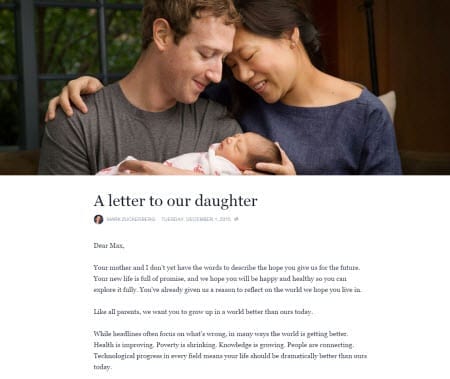Mark Zuckerberg and Priscilla Chan to donate 99% of their Facebook stock
Facebook founder Mark Zuckerberg and his wife Dr Priscilla Chan marked the birth of their daughter Max with the announcement that they will give away 99% of their Facebook stock to support education and health initiatives.
This means that they will give, over time, $45 billion (£30 billion) to charity. The money will be given to the newly created Chan Zuckerberg Initiative.
They announced the gift in an open letter to their newborn daughter, saying:
Advertisement
“Like all parents, we want you to grow up in a world better than ours today”.
The announcement of this gift was made on Giving Tuesday, a now global initiative to promote charitable giving and involvement.
Zuckerberg and Chan will begin by donating up to $1 billion of Facebook stock each year for the next three years.
Other major donors
The decision by Zuckerberg and Chan follows in the footsteps of other wealthy people who have signed up to the Giving Pledge to commit themselves to donating the bulk of their wealth to charities during their lifetime.
Investor Warren Buffett, one of the initiators of the Giving Pledge, praised Chan and Zuckerberg for their decision and their relatively young age, saying that, in terms of giving such large sums, “30 is the new 70”.
Buffett has so far given over $17 billion, and Bill and Melinda Gates have donated $29 billion to charitable activities. Investor George Soros has donated about $11 billion.
Steel magnate Andrew Carnegie still tops the list of the most generous individual donor. He gave away almost all his wealth, worth around $100 billion today, before he died.
Big Philanthropy raises questions
While many have welcomed the commitment to make such a transformative and ongoing gift, it does raise some questions. Dr Beth Breeze summarises them in her analysis in Zuckerberg: the applause, the criticism and the need to discuss philanthropy. They include:
• the creation of their own foundation suggests an apparent lack of trust in existing charitable initiatives, and a need to control expenditure
• the concentration of extensive philanthropic power in the hands of a few individuals
• public taxes being redirected through tax relief to charitable interests of a few individuals
• contrast between Facebook’s corporate tax position and CSR activities and its founder’s private philanthropy
Donation to a company, not a charitable foundation
https://twitter.com/eisingerj/status/672049978471276544
The Chan Zuckerberg Initiative isn’t even a charitable foundation, but a LLC or limited liability company.
However, this gives the couple much more flexibility than a traditional foundation in how and when they spend the money; for example, it means that they can use it for lobbying work.
This was acknowledged in a statement by Facebook spokesperson Vanessa Chan who wrote:
“This includes but isn’t limited to funding nonprofit organizations, making private investments and participating in policy debates with the goal of generating the greatest impact.”
Yet Dr Breeze and her colleagues at the Centre for Philanthropy at the University of Kent welcome the fact that these issues are being raised. She said:
“Philanthropy is an arena in which such debates thrive because there is no fixed agreement on exactly what philanthropy is, why it exists or what it can and should achieve. This is what makes it such an interesting part of life to study and think about”.




